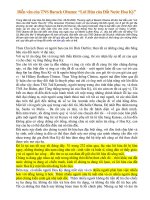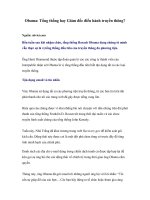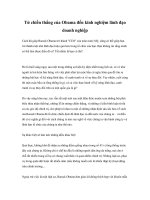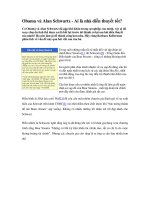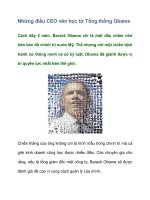becoming michelle obama
Bạn đang xem bản rút gọn của tài liệu. Xem và tải ngay bản đầy đủ của tài liệu tại đây (22.36 MB, 465 trang )
Copyright © 2018 by Michelle Obama
All rights reserved.
Published in the United States by Crown, an imprint of the Crown Publishing Group,
a division of Penguin Random House LLC, New York.
crownpublishing.com
CROWN and the Crown colophon are registered trademarks of Penguin Random
House LLC.
Photograph credits appear on this page.
Library of Congress Cataloging-in-Publication Data is available upon request.
ISBN 9781524763138
Ebook ISBN 9781524763152
Cover design by Christopher Brand
Cover photograph by Miller Mobley
v5.4
ep
To all the people who have helped me become:
the folks who raised me—Fraser, Marian, Craig, and my vast
extended family,
my circle of strong women, who always lift me up,
my loyal and dedicated staff, who continue to make me proud.
To the loves of my life:
Malia and Sasha, my two most precious peas, who are my reasons
for being,
and finally, Barack, who always promised me an interesting
journey.
Contents
Endpaper Photographs
Preface
Becoming Me
Chapter 1
Chapter 2
Chapter 3
Chapter 4
Chapter 5
Chapter 6
Chapter 7
Chapter 8
Becoming Us
Chapter 9
Chapter 10
Chapter 11
Chapter 12
Chapter 13
Chapter 14
Chapter 15
Chapter 16
Photograph Insert
Chapter 17
Chapter 18
Becoming More
Chapter 19
Chapter 20
Chapter 21
Chapter 22
Chapter 23
Chapter 24
Epilogue
Acknowledgments
Photograph Credits
Preface
March 2017
W
hen I was a kid, my aspirations were simple. I wanted a dog. I wanted
a house that had stairs in it—two floors for one family. I wanted, for some
reason, a four-door station wagon instead of the two-door Buick that was my
father’s pride and joy. I used to tell people that when I grew up, I was going
to be a pediatrician. Why? Because I loved being around little kids and I
quickly learned that it was a pleasing answer for adults to hear. Oh, a doctor!
What a good choice! In those days, I wore pigtails and bossed my older brother
around and managed, always and no matter what, to get As at school. I was
ambitious, though I didn’t know exactly what I was shooting for. Now I
think it’s one of the most useless questions an adult can ask a child—What do
you want to be when you grow up? As if growing up is finite. As if at some point
you become something and that’s the end.
So far in my life, I’ve been a lawyer. I’ve been a vice president at a
hospital and the director of a nonprofit that helps young people build
meaningful careers. I’ve been a working-class black student at a fancy mostly
white college. I’ve been the only woman, the only African American, in all
sorts of rooms. I’ve been a bride, a stressed-out new mother, a daughter torn
up by grief. And until recently, I was the First Lady of the United States of
America—a job that’s not officially a job, but that nonetheless has given me a
platform like nothing I could have imagined. It challenged me and humbled
me, lifted me up and shrank me down, sometimes all at once. I’m just
beginning to process what took place over these last years—from the moment
in 2006 when my husband first started talking about running for president to
the cold morning this winter when I climbed into a limo with Melania
Trump, accompanying her to her husband’s inauguration. It’s been quite a
ride.
When you’re First Lady, America shows itself to you in its extremes. I’ve
been to fund-raisers in private homes that look more like art museums, houses
where people own bathtubs made from gemstones. I’ve visited families who
lost everything in Hurricane Katrina and were tearful and grateful just to have
a working refrigerator and stove. I’ve encountered people I find to be shallow
and hypocritical and others—teachers and military spouses and so many more
—whose spirits are so deep and strong it’s astonishing. And I’ve met kids—lots
of them, all over the world—who crack me up and fill me with hope and
who blessedly manage to forget about my title once we start rooting around in
the dirt of a garden.
Since stepping reluctantly into public life, I’ve been held up as the most
powerful woman in the world and taken down as an “angry black woman.”
I’ve wanted to ask my detractors which part of that phrase matters to them the
most—is it “angry” or “black” or “woman”? I’ve smiled for photos with
people who call my husband horrible names on national television, but still
want a framed keepsake for their mantel. I’ve heard about the swampy parts of
the internet that question everything about me, right down to whether I’m a
woman or a man. A sitting U.S. congressman has made fun of my butt. I’ve
been hurt. I’ve been furious. But mostly, I’ve tried to laugh this stuff off.
There’s a lot I still don’t know about America, about life, about what the
future might bring. But I do know myself. My father, Fraser, taught me to
work hard, laugh often, and keep my word. My mother, Marian, showed me
how to think for myself and to use my voice. Together, in our cramped
apartment on the South Side of Chicago, they helped me see the value in our
story, in my story, in the larger story of our country. Even when it’s not
pretty or perfect. Even when it’s more real than you want it to be. Your story
is what you have, what you will always have. It is something to own.
For eight years, I lived in the White House, a place with more stairs than
I can count—plus elevators, a bowling alley, and an in-house florist. I slept in
a bed that was made up with Italian linens. Our meals were cooked by a team
of world-class chefs and delivered by professionals more highly trained than
those at any five-star restaurant or hotel. Secret Service agents, with their
earpieces and guns and deliberately flat expressions, stood outside our doors,
doing their best to stay out of our family’s private life. We got used to it,
eventually, sort of—the strange grandeur of our new home and also the
constant, quiet presence of others.
The White House is where our two girls played ball in the hallways and
climbed trees on the South Lawn. It’s where Barack sat up late at night,
poring over briefings and drafts of speeches in the Treaty Room, and where
Sunny, one of our dogs, sometimes pooped on the rug. I could stand on the
Truman Balcony and watch the tourists posing with their selfie sticks and
peering through the iron fence, trying to guess at what went on inside. There
were days when I felt suffocated by the fact that our windows had to be kept
shut for security, that I couldn’t get some fresh air without causing a fuss.
There were other times when I’d be awestruck by the white magnolias
blooming outside, the everyday bustle of government business, the majesty of
a military welcome. There were days, weeks, and months when I hated
politics. And there were moments when the beauty of this country and its
people so overwhelmed me that I couldn’t speak.
Then it was over. Even if you see it coming, even as your final weeks are
filled with emotional good-byes, the day itself is still a blur. A hand goes on a
Bible; an oath gets repeated. One president’s furniture gets carried out while
another’s comes in. Closets are emptied and refilled in the span of a few hours.
Just like that, there are new heads on new pillows—new temperaments, new
dreams. And when it ends, when you walk out the door that last time from
the world’s most famous address, you’re left in many ways to find yourself
again.
So let me start here, with a small thing that happened not long ago. I was
at home in the redbrick house that my family recently moved into. Our new
house sits about two miles from our old house, on a quiet neighborhood
street. We’re still settling in. In the family room, our furniture is arranged the
same way it was in the White House. We’ve got mementos around the house
that remind us it was all real—photos of our family time at Camp David,
handmade pots given to me by Native American students, a book signed by
Nelson Mandela. What was strange about this night was that everyone was
gone. Barack was traveling. Sasha was out with friends. Malia’s been living
and working in New York, finishing out her gap year before college. It was
just me, our two dogs, and a silent, empty house like I haven’t known in eight
years.
And I was hungry. I walked down the stairs from our bedroom with the
dogs following on my heels. In the kitchen, I opened the fridge. I found a loaf
of bread, took out two pieces, and laid them in the toaster oven. I opened a
cabinet and got out a plate. I know it’s a weird thing to say, but to take a plate
from a shelf in the kitchen without anyone first insisting that they get it for
me, to stand by myself watching bread turn brown in the toaster, feels as close
to a return to my old life as I’ve come. Or maybe it’s my new life just
beginning to announce itself.
In the end, I didn’t just make toast; I made cheese toast, moving my
slices of bread to the microwave and melting a fat mess of gooey cheddar
between them. I then carried my plate outside to the backyard. I didn’t have
to tell anyone I was going. I just went. I was in bare feet, wearing a pair of
shorts. The chill of winter had finally lifted. The crocuses were just starting to
push up through the beds along our back wall. The air smelled like spring. I
sat on the steps of our veranda, feeling the warmth of the day’s sun still caught
in the slate beneath my feet. A dog started barking somewhere in the distance,
and my own dogs paused to listen, seeming momentarily confused. It
occurred to me that it was a jarring sound for them, given that we didn’t have
neighbors, let alone neighbor dogs, at the White House. For them, all this was
new. As the dogs loped off to explore the perimeter of the yard, I ate my toast
in the dark, feeling alone in the best possible way. My mind wasn’t on the
group of guards with guns sitting less than a hundred yards away at the
custom-built command post inside our garage, or the fact that I still can’t walk
down a street without a security detail. I wasn’t thinking about the new
president or for that matter the old president, either.
I was thinking instead about how in a few minutes I would go back
inside my house, wash my plate in the sink, and head up to bed, maybe
opening a window so I could feel the spring air—how glorious that would be.
I was thinking, too, that the stillness was affording me a first real opportunity
to reflect. As First Lady, I’d get to the end of a busy week and need to be
reminded how it had started. But time is beginning to feel different. My girls,
who arrived at the White House with their Polly Pockets, a blanket named
Blankie, and a stuffed tiger named Tiger, are now teenagers, young women
with plans and voices of their own. My husband is making his own
adjustments to life after the White House, catching his own breath. And here
I am, in this new place, with a lot I want to say.
Becoming Me
1
I
spent much of my childhood listening to the sound of striving. It came in
the form of bad music, or at least amateur music, coming up through the
floorboards of my bedroom—the plink plink plink of students sitting downstairs
at my great-aunt Robbie’s piano, slowly and imperfectly learning their scales.
My family lived in the South Shore neighborhood of Chicago, in a tidy brick
bungalow that belonged to Robbie and her husband, Terry. My parents
rented an apartment on the second floor, while Robbie and Terry lived on
the first. Robbie was my mother’s aunt and had been generous to her over
many years, but to me she was kind of a terror. Prim and serious, she directed
the choir at a local church and was also our community’s resident piano
teacher. She wore sensible heels and kept a pair of reading glasses on a chain
around her neck. She had a sly smile but didn’t appreciate sarcasm the way my
mother did. I’d sometimes hear her chewing out her students for not having
practiced enough or chewing out their parents for delivering them late to
lessons.
“Good night!” she’d exclaim in the middle of the day, with the same
blast of exasperation someone else might say, “Oh, for God’s sake!” Few, it
seemed, could live up to Robbie’s standards.
The sound of people trying, however, became the soundtrack to our life.
There was plinking in the afternoons, plinking in the evenings. Ladies from
church sometimes came over to practice hymns, belting their piety through
our walls. Under Robbie’s rules, kids who took piano lessons were allowed to
work on only one song at a time. From my room, I’d listen to them
attempting, note by uncertain note, to win her approval, graduating from
“Hot Cross Buns” to “Brahms’s Lullaby,” but only after many tries. The
music was never annoying; it was just persistent. It crept up the stairwell that
separated our space from Robbie’s. It drifted through open windows in
summertime, accompanying my thoughts as I played with my Barbies or built
little kingdoms made out of blocks. The only respite came when my father
got home from an early shift at the city’s water treatment plant and put the
Cubs game on TV, boosting the volume just enough to blot it all out.
This was the tail end of the 1960s on the South Side of Chicago. The
Cubs weren’t bad, but they weren’t great, either. I’d sit on my dad’s lap in his
recliner and listen to him narrate how the Cubs were in the middle of a lateseason swoon or why Billy Williams, who lived just around the corner from
us on Constance Avenue, had such a sweet swing from the left side of the
plate. Outside the ballparks, America was in the midst of a massive and
uncertain shift. The Kennedys were dead. Martin Luther King Jr. had been
killed standing on a balcony in Memphis, setting off riots across the country,
including in Chicago. The 1968 Democratic National Convention turned
bloody as police went after Vietnam War protesters with batons and tear gas in
Grant Park, about nine miles north of where we lived. White families,
meanwhile, were moving out of the city in droves, lured by the suburbs—the
promise of better schools, more space, and probably more whiteness, too.
None of this really registered with me. I was just a kid, a girl with
Barbies and blocks, with two parents and an older brother who slept each
night with his head about three feet from mine. My family was my world, the
center of everything. My mother taught me how to read early, walking me to
the public library, sitting with me as I sounded out words on a page. My
father went to work every day dressed in the blue uniform of a city laborer,
but at night he showed us what it meant to love jazz and art. As a boy, he’d
taken classes at the Art Institute of Chicago, and in high school he’d painted
and sculpted. He’d been a competitive swimmer and boxer in school, too, and
as an adult was a fan of every televised sport, from professional golf to the
NHL. He appreciated seeing strong people excel. When my brother, Craig,
got interested in basketball, my father propped coins above the doorframe in
our kitchen, encouraging him to leap for them.
Everything that mattered was within a five-block radius—my
grandparents and cousins, the church on the corner where we were not quite
regulars at Sunday school, the gas station where my mother sometimes sent
me to pick up a pack of Newports, and the liquor store, which also sold
Wonder bread, penny candy, and gallons of milk. On hot summer nights,
Craig and I dozed off to the sound of cheers from the adult-league softball
games going on at the nearby public park, where by day we climbed on the
playground jungle gym and played tag with other kids.
Craig and I are not quite two years apart in age. He’s got my father’s soft
eyes and optimistic spirit, my mother’s implacability. The two of us have
always been tight, in part thanks to an unwavering and somewhat inexplicable
allegiance he seemed to feel for his baby sister right from the start. There’s an
early family photograph, a black and white of the four of us sitting on a
couch, my mother smiling as she holds me on her lap, my father appearing
serious and proud with Craig perched on his. We’re dressed for church or
maybe a wedding. I’m about eight months old, a pudge-faced, no-nonsense
bruiser in diapers and an ironed white dress, looking ready to slide out of my
mother’s clutches, staring down the camera as if I might eat it. Next to me is
Craig, gentlemanly in a little bow tie and suit jacket, bearing an earnest
expression. He’s two years old and already the portrait of brotherly vigilance
and responsibility—his arm extended toward mine, his fingers wrapped
protectively around my fat wrist.
At the time the photo was taken, we were living across the hall from my
father’s parents in Parkway Gardens, an affordable housing project on the
South Side made up of modernist apartment buildings. It had been built in the
1950s and was designed as a co-op, meant to ease a post–World War II
housing shortage for black working-class families. Later, it would deteriorate
under the grind of poverty and gang violence, becoming one of the city’s
more dangerous places to live. Long before this, though, when I was still a
toddler, my parents—who had met as teenagers and married in their midtwenties—accepted an offer to move a few miles south to Robbie and Terry’s
place in a nicer neighborhood.
On Euclid Avenue, we were two households living under one not very
big roof. Judging from the layout, the second-floor space had probably been
designed as an in-law apartment meant for one or two people, but four of us
found a way to fit inside. My parents slept in the lone bedroom, while Craig
and I shared a bigger area that I assume was intended to be the living room.
Later, as we grew, my grandfather—Purnell Shields, my mother’s father, who
was an enthusiastic if not deeply skilled carpenter—brought over some cheap
wooden paneling and built a makeshift partition to divide the room into two
semiprivate spaces. He added a plastic accordion door to each space and
created a little common play area in front where we could keep our toys and
books.
I loved my room. It was just big enough for a twin bed and a narrow
desk. I kept all my stuffed animals on the bed, painstakingly tucking them
around my head each night as a form of ritual comfort. On his side of the
wall, Craig lived a sort of mirror existence with his own bed pushed up
against the paneling, parallel to mine. The partition between us was so flimsy
that we could talk as we lay in bed at night, often tossing a balled sock back
and forth through the ten-inch gap between the partition and the ceiling as
we did.
Aunt Robbie, meanwhile, kept her part of the house like a mausoleum,
the furniture swathed in protective plastic that felt cold and sticky on my bare
legs when I dared sit on it. Her shelves were loaded with porcelain figurines
we weren’t allowed to touch. I’d let my hand hover over a set of sweet-faced
glass poodles—a delicate-looking mother and three tiny puppies—and then
pull it back, fearing Robbie’s wrath. When lessons weren’t happening, the first
floor was deadly silent. The television was never on, the radio never played.
I’m not even sure the two of them talked much down there. Robbie’s
husband’s full name was William Victor Terry, but for some reason we called
him only by his last name. Terry was like a shadow, a distinguished-looking
man who wore three-piece suits every day of the week and pretty much never
said a word.
I came to think of upstairs and downstairs as two different universes,
ruled over by competing sensibilities. Upstairs, we were noisy and
unapologetically so. Craig and I threw balls and chased each other around the
apartment. We sprayed Pledge furniture polish on the wood floor of the
hallway so we could slide farther and faster in our socks, often crashing into
the walls. We held brother-sister boxing matches in the kitchen, using the two
sets of gloves my dad had given us for Christmas, along with personalized
instructions on how to land a proper jab. At night, as a family, we played
board games, told stories and jokes, and cranked Jackson 5 records on the
stereo. When it got to be too much for Robbie down below, she’d
emphatically flick the light switch in our shared stairwell, which also
controlled the lightbulb in our upstairs hallway, off and on, again and again—
her polite-ish way of telling us to pipe down.
Robbie and Terry were older. They grew up in a different era, with
different concerns. They’d seen things our parents hadn’t—things that Craig
and I, in our raucous childishness, couldn’t begin to guess. This was some
version of what my mother would say if we got too wound up about the
grouchiness downstairs. Even if we didn’t know the context, we were
instructed to remember that context existed. Everyone on earth, they’d tell us,
was carrying around an unseen history, and that alone deserved some
tolerance. Robbie, I’d learn many years later, had sued Northwestern
University for discrimination, having registered for a choral music workshop
there in 1943 and been denied a room in the women’s dorm. She was
instructed to stay instead in a rooming house in town—a place “for coloreds,”
she was told. Terry, meanwhile, had once been a Pullman porter on one of
the overnight passenger rail lines running in and out of Chicago. It was a
respectable if not well-paying profession, made up entirely of black men who
kept their uniforms immaculate while also hauling luggage, serving meals, and
generally tending to the needs of train passengers, including shining their
shoes.
Years after his retirement, Terry still lived in a state of numbed formality
—impeccably dressed, remotely servile, never asserting himself in any way, at
least that I would see. It was as if he’d surrendered a part of himself as a way of
coping. I’d watch him mow our lawn in the high heat of summer in a pair of
wing tips, suspenders, and a thin-brimmed fedora, the sleeves of his dress shirt
carefully rolled up. He’d indulge himself by having exactly one cigarette a day
and exactly one cocktail a month, and even then he wouldn’t loosen up the
way my father and mother would after having a highball or a Schlitz, which
they did a few times a month. Some part of me wanted Terry to talk, to spill
whatever secrets he carried. I imagined that he had all sorts of interesting
stories about cities he’d visited and how rich people on trains behaved or
maybe didn’t. But we wouldn’t hear any of it. For some reason, he’d never
tell.



